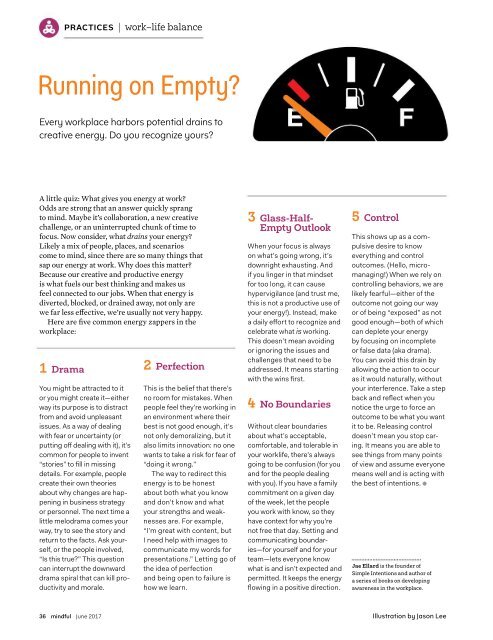Mindful June 2017
Create successful ePaper yourself
Turn your PDF publications into a flip-book with our unique Google optimized e-Paper software.
PRACTICES | work–life balance<br />
Running on Empty?<br />
Every workplace harbors potential drains to<br />
creative energy. Do you recognize yours?<br />
A little quiz: What gives you energy at work?<br />
Odds are strong that an answer quickly sprang<br />
to mind. Maybe it’s collaboration, a new creative<br />
challenge, or an uninterrupted chunk of time to<br />
focus. Now consider, what drains your energy?<br />
Likely a mix of people, places, and scenarios<br />
come to mind, since there are so many things that<br />
sap our energy at work. Why does this matter?<br />
Because our creative and productive energy<br />
is what fuels our best thinking and makes us<br />
feel connected to our jobs. When that energy is<br />
diverted, blocked, or drained away, not only are<br />
we far less effective, we’re usually not very happy.<br />
Here are five common energy zappers in the<br />
workplace:<br />
1 Drama<br />
You might be attracted to it<br />
or you might create it—either<br />
way its purpose is to distract<br />
from and avoid unpleasant<br />
issues. As a way of dealing<br />
with fear or uncertainty (or<br />
putting off dealing with it), it’s<br />
common for people to invent<br />
“stories” to fill in missing<br />
details. For example, people<br />
create their own theories<br />
about why changes are happening<br />
in business strategy<br />
or personnel. The next time a<br />
little melodrama comes your<br />
way, try to see the story and<br />
return to the facts. Ask yourself,<br />
or the people involved,<br />
“Is this true?” This question<br />
can interrupt the downward<br />
drama spiral that can kill productivity<br />
and morale.<br />
2 Perfection<br />
This is the belief that there’s<br />
no room for mistakes. When<br />
people feel they’re working in<br />
an environment where their<br />
best is not good enough, it’s<br />
not only demoralizing, but it<br />
also limits innovation: no one<br />
wants to take a risk for fear of<br />
“doing it wrong.”<br />
The way to redirect this<br />
energy is to be honest<br />
about both what you know<br />
and don’t know and what<br />
your strengths and weaknesses<br />
are. For example,<br />
“I’m great with content, but<br />
I need help with images to<br />
communicate my words for<br />
presentations.” Letting go of<br />
the idea of perfection<br />
and being open to failure is<br />
how we learn.<br />
3 Glass-Half-<br />
Empty Outlook<br />
When your focus is always<br />
on what’s going wrong, it’s<br />
downright exhausting. And<br />
if you linger in that mindset<br />
for too long, it can cause<br />
hypervigilance (and trust me,<br />
this is not a productive use of<br />
your energy!). Instead, make<br />
a daily effort to recognize and<br />
celebrate what is working.<br />
This doesn’t mean avoiding<br />
or ignoring the issues and<br />
challenges that need to be<br />
addressed. It means starting<br />
with the wins first.<br />
4 No Boundaries<br />
Without clear boundaries<br />
about what’s acceptable,<br />
comfortable, and tolerable in<br />
your worklife, there’s always<br />
going to be confusion (for you<br />
and for the people dealing<br />
with you). If you have a family<br />
commitment on a given day<br />
of the week, let the people<br />
you work with know, so they<br />
have context for why you’re<br />
not free that day. Setting and<br />
communicating boundaries—for<br />
yourself and for your<br />
team—lets everyone know<br />
what is and isn’t expected and<br />
permitted. It keeps the energy<br />
flowing in a positive direction.<br />
5 Control<br />
This shows up as a compulsive<br />
desire to know<br />
everything and control<br />
outcomes. (Hello, micromanaging!)<br />
When we rely on<br />
controlling behaviors, we are<br />
likely fearful—either of the<br />
outcome not going our way<br />
or of being “exposed” as not<br />
good enough—both of which<br />
can deplete your energy<br />
by focusing on incomplete<br />
or false data (aka drama).<br />
You can avoid this drain by<br />
allowing the action to occur<br />
as it would naturally, without<br />
your interference. Take a step<br />
back and reflect when you<br />
notice the urge to force an<br />
outcome to be what you want<br />
it to be. Releasing control<br />
doesn’t mean you stop caring.<br />
It means you are able to<br />
see things from many points<br />
of view and assume everyone<br />
means well and is acting with<br />
the best of intentions. ●<br />
Jae Ellard is the founder of<br />
Simple Intentions and author of<br />
a series of books on developing<br />
awareness in the workplace.<br />
36 mindful <strong>June</strong> <strong>2017</strong> Illustration by Jason Lee


